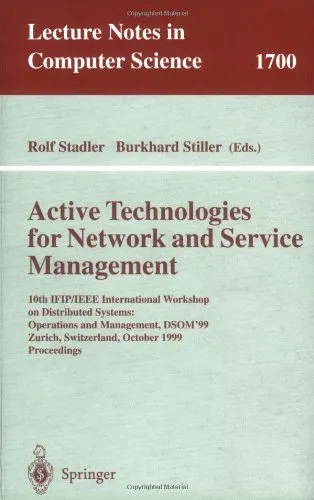Network Strategy (Advances in Strategic Management)
4.0
Reviews from our users

You Can Ask your questions from this book's AI after Login
Each download or ask from book AI costs 2 points. To earn more free points, please visit the Points Guide Page and complete some valuable actions.Related Refrences:
Introduction to "Network Strategy (Advances in Strategic Management)"
In today’s dynamic and interconnected business environment, organizations increasingly rely on networks to achieve competitive advantage, innovation, and sustained growth. “Network Strategy (Advances in Strategic Management)”, authored by Joel Baum and Tim Rowley, offers a scholarly exploration of the intricate dynamics and strategic importance of networks in shaping the modern strategic management landscape. Through rigorous research, theoretical insights, and practical applications, this book not only highlights the significance of networks but also explains their role in redefining traditional business models. From managerial decision-making to inter-organizational alliances, the book stretches across multi-disciplinary boundaries, making it a cornerstone for understanding strategy in a networked world.
Summary of the Book
Network Strategy delves deep into the mechanisms and implications of strategic networks within and across organizational boundaries. The book examines how networks function as conduits for resources, information, and innovation, offering businesses a unique pathway to enhance performance and achieve long-term objectives. Far from limiting itself to theoretical perspectives, the book extensively investigates real-world examples of networks in action—be it collaborations between rival companies, strategic alliances, partnerships, or the increasingly significant role networks play in entrepreneurship and innovation ecosystems.
One of the key strengths of the book lies in its multidimensional approach. It integrates insights from economics, sociology, and management studies, emphasizing how resource sharing, trust, and reciprocity within a network context can lead to enhanced outcomes for all stakeholders. This book also considers the challenges associated with managing networks, such as power imbalances, opportunism, and conflicts, offering robust frameworks and strategies to overcome these obstacles. Moreover, the dynamic nature of networks, particularly in an era of digital transformation, is also featured prominently. From traditional supplier-buyer relationships to cutting-edge platform ecosystems, the book captures the full spectrum of network strategies that underpin modern commerce and innovation-driven organizations.
Key Takeaways
This book is both an academic milestone and a practical manual for executives, researchers, and students of strategic management. Some of the key insights include:
- The critical roles that trust, collaboration, and reciprocity play in creating efficient and effective networks.
- Frameworks to measure and analyze the value created by a network and the interdependence between its actors.
- Strategies to address structural and strategic challenges within complex networks.
- An exploration into how digital networks are rewriting the rules of competition and reshaping supply chains.
- Practical tools for managers to assess, design, and leverage networks that drive competitive advantage.
Famous Quotes from the Book
Every great book is enriched with powerful ideas, and Network Strategy is no exception. Here are some thought-provoking quotes that encapsulate the essence of the book:
"In a networked world, no organization is an island. Success depends not just on individual effort but rather on the strength and structure of the connections we make."
"Networks are not static entities; they are living, evolving ecosystems that must be cultivated and strategically nurtured."
"Collaboration within networks fosters innovation, but only when trust and shared value exist as central pillars."
Why This Book Matters
The importance of Network Strategy cannot be overstated. In a business world increasingly characterized by inter-connectivity, this book provides an essential roadmap for navigating and leveraging the power of networks. It bridges the gap between theory and application, making it relevant to a broad audience, including business leaders, entrepreneurs, policy makers, and academics.
By focusing not only on the benefits but also on the inherent complexities and challenges of networks, the authors provide a balanced and nuanced perspective. This is especially crucial in the current era, where global supply chains, platform ecosystems, and knowledge-sharing networks are playing transformative roles in industries ranging from technology to healthcare.
Moreover, as organizations grapple with the digital revolution, challenges such as data privacy, platform monopolies, and network fragility emerge. Network Strategy equips readers with the insights and tools necessary to address such pressing concerns, thereby fostering more resilient and adaptive networked organizations.
Ultimately, this book matters because it empowers organizations and individuals to think holistically about their strategic relationships. Whether you aim to design an innovative partnership, manage complex stakeholder networks, or simply understand how interconnected systems can generate value, this book is your definitive guide. It elevates strategic management beyond the boundaries of the individual firm, into a more collaborative and networked paradigm entirely.
Free Direct Download
You Can Download this book after Login
Accessing books through legal platforms and public libraries not only supports the rights of authors and publishers but also contributes to the sustainability of reading culture. Before downloading, please take a moment to consider these options.
Find this book on other platforms:
WorldCat helps you find books in libraries worldwide.
See ratings, reviews, and discussions on Goodreads.
Find and buy rare or used books on AbeBooks.
1412
بازدید4.0
امتیاز0
نظر98%
رضایتReviews:
4.0
Based on 0 users review
Questions & Answers
Ask questions about this book or help others by answering
No questions yet. Be the first to ask!














